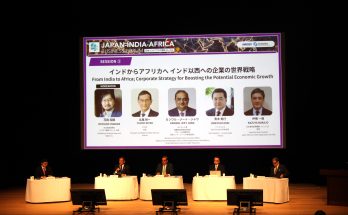 As emerging powers expand their development cooperation as an integral part of their foreign policies, analyses have tended to be very China- centric. This tends to limit the scope of the wider trend taking place, paying too little attention to India, Brazil, and South Africa. India has played an increasingly important role in this area as reflected by the establishment of the Development Partnership Agency (DPA) in 2012, reducing the number of countries providing India with official development aid (ODA) while increasing its own share of development cooperation to developing countries. Like other emerging powers, India continues to confront a myriad of internal challenges related to security, poverty alleviation and ensuring that the fruits of rapid economic growth are shared with a wider section of Indian society.
As emerging powers expand their development cooperation as an integral part of their foreign policies, analyses have tended to be very China- centric. This tends to limit the scope of the wider trend taking place, paying too little attention to India, Brazil, and South Africa. India has played an increasingly important role in this area as reflected by the establishment of the Development Partnership Agency (DPA) in 2012, reducing the number of countries providing India with official development aid (ODA) while increasing its own share of development cooperation to developing countries. Like other emerging powers, India continues to confront a myriad of internal challenges related to security, poverty alleviation and ensuring that the fruits of rapid economic growth are shared with a wider section of Indian society.
On the global stage, India has sought to be a champion of South-South Cooperation (SSC), addressing issues which resonate deeply with developing countries. In the past decade the Indian private sector has increasingly played a larger role in Africa, and the Indian government has gradually expanded its diplomatic relations with African countries, regional organisations and the African Union (AU).
As a rapidly growing market, Africa presents Indian companies great opportunities as their companies look to expand beyond India’s borders. Despite persistent challenges such as security, corruption, poverty, and weak institutions, many African countries have now emerged as among the world’s fastest growing economies. Besides its growing market, Africa also presents an emerging power such as India opportunities in accessing energy and mineral resources to fuel its development and is home to the largest number of developing countries in the world. Against this backdrop, the African continent is critical to winning the support that India needs to realise some of its aims in multilateral structures such as the United Nations (UN), World Trade Organisation (WTO), World Bank, and International Monetary Fund (IMF).
While emerging powers embrace similar principles, they have adopted varying strategies, focusing on different modes of development cooperation, while also focusing on different sectors. Thus, while China has become well known for its role in building Africa’s infrastructure, other emerging powers have predominantly invested their resources in other modes and sectors of development cooperation.
Through instruments such as the Indian Technical and Economic Cooperation (ITEC) Programme and Special Commonwealth Assistance for Africa Programme (SCAAP), India has predominantly focused its efforts on human capacity development and trained thousands of civil servants from across Africa in areas such as entrepreneurship, business management, information and communication technology (ICT), finance, trade, and medicine. This has meant that thousands of civil servants and university students have had access to India’s educational institutions. This is an essential contribution, building Africa’s soft infrastructure.
With pledges made at the India-Africa Forum Summits of 2008 and 2011 to build up to 100 new training institutions, and the ongoing implementation of different phases of the innovative Pan-Africa eNetwork, India is showing its strengths, showcasing how it can contribute to Africa’s development. Even as it looks to increase funding in areas like hard infrastructure, India’s strategy should continue to be centred on human capacity development while expanding its instruments. As emerging powers expand their role in development cooperation, this strategy will allow India to distinguish itself among other emerging powers and even developed countries in the area of development cooperation. Since emerging powers will not only be judged by their principles, but also on tangible results, it is important that India remains focussed on its strengths while simultaneously building capacity in other areas.
(Philani Mthembu is a South African scholar based at the Graduate School of Global Politics (GSGP) at the Freie Universitaet, Berlin (FUB) in Germany. His PhD dissertation is on the rise of emerging powers as sources of development cooperation in Africa).
Author Profile
- India Writes Network (www.indiawrites.org) is an emerging think tank and a media-publishing company focused on international affairs & the India Story. Centre for Global India Insights is the research arm of India Writes Network. To subscribe to India and the World, write to editor@indiawrites.org. A venture of TGII Media Private Limited, a leading media, publishing and consultancy company, IWN has carved a niche for balanced and exhaustive reporting and analysis of international affairs. Eminent personalities, politicians, diplomats, authors, strategy gurus and news-makers have contributed to India Writes Network, as also “India and the World,” a magazine focused on global affairs.
Latest entries
 DiplomacyJanuary 5, 2026India walks diplomatic tightrope over US operation in Venezuela
DiplomacyJanuary 5, 2026India walks diplomatic tightrope over US operation in Venezuela India and the WorldNovember 26, 2025G20@20: Africa’s Moment – The Once and Future World Order
India and the WorldNovember 26, 2025G20@20: Africa’s Moment – The Once and Future World Order DiplomacyOctober 4, 2025UNGA Resolution 2758 Must Not Be Distorted, One-China Principle Brooks No Challenge
DiplomacyOctober 4, 2025UNGA Resolution 2758 Must Not Be Distorted, One-China Principle Brooks No Challenge India and the WorldJuly 26, 2025MPs, diplomats laud Operation Sindoor, call for national unity to combat Pakistan-sponsored terror
India and the WorldJuly 26, 2025MPs, diplomats laud Operation Sindoor, call for national unity to combat Pakistan-sponsored terror







